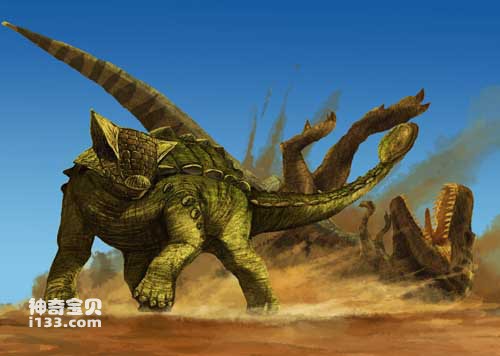Ankylosaurus was named in 1908 and mainly lived in Montana, Mexico and Bolivia in South America. There are currently three very complete skeleton fossils, so we fully understand the shape of this dinosaur. Its limbs are thick and short, the neck is shortened, and the skull is wide. The body is about 7.5 to 10.7 meters long, 1.8 meters wide, 1.2 meters high, and weighs only 3 to 4 tons. How can the seemingly small Ankylosaurus fight against the large carnivorous dinosaurs? How does it defend itself? Let's see, from the perspective of self-defense methods, Ankylosaurus has developed itself to its peak.
The sides of the body of this dinosaur armored vehicle are covered with bony armor plates, which are produced by many bones being fused together. These armor plates are also densely covered with vertebral processes. The same structure is found in the head of Ankylosaurus. The fossils show that there are bones in the eye area, indicating that its eyelids also had armor. The skull itself, which is made of welded bones, is quite strong, but the space left for the brain is correspondingly smaller. There are actually equal pros and cons. Most of the Ankylosaurus's hips to its tail were covered with dagger-like spines, and there were also rows of spines on each side of its body.
The only offensive (or active defense) weapon of Ankylosaurus is the hammer-shaped bone on its tail. The hammer-shaped bone is double egg-shaped and is located at the end of the tail. It is worth noting that the tail hammer is not solid, but has holes. We generally think that the tail with the tail hammer was used as a weapon, but there have been other theories that the club-like tail was used to lift the tail high in the air to make it look like a dinosaur head, and then hide behind the hadrosaurus. among the group. The likelihood of this scenario is low, as there is little benefit to hiding among hadrosaurs when they attract predators. We are therefore convinced that the tail hammer is used as an active defense weapon. When using the tail hammer, it attacks with a fan swinging from side to side. With a weight of 2 tons and a short body, the tail itself is elastic and powerful, so the attack power of the Ankylosaurus tail hammer cannot be underestimated. The leg bones of tyrannosaurs are easily broken under its attack, and broken legs The fate of skeletal tyrannosaurs is usually death, because they lose the ability to hunt and even move.

Chinese name: Ankylosaurus
Latin name: Ankylosaurus
Age of survival: Late Cretaceous
Fossil origin: Bolivia, South America, Montana, USA, Mexico
Physical characteristics: 7.5 to 10.7 meters long
Diet: plants
Type: Ankylosaur
Definition: sturdy lizard
animal tags: Ankylosaurus
We created this article in conjunction with AI technology, then made sure it was fact-checked and edited by a Animals Top editor.